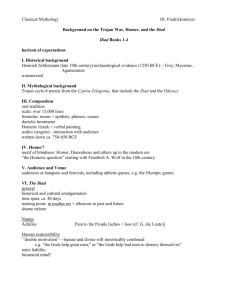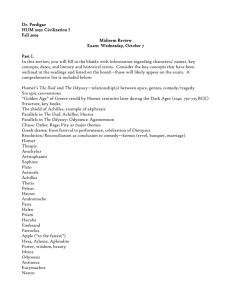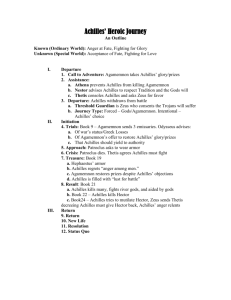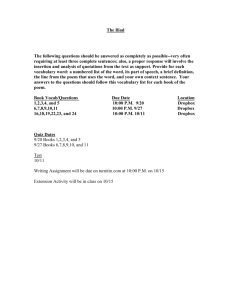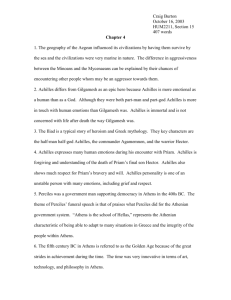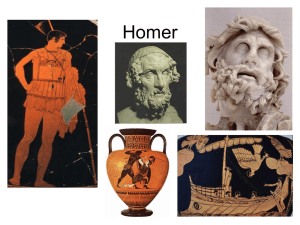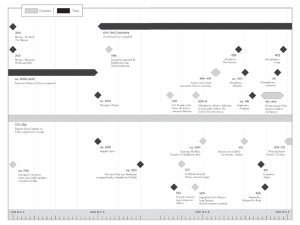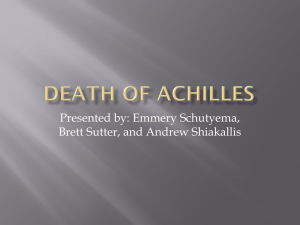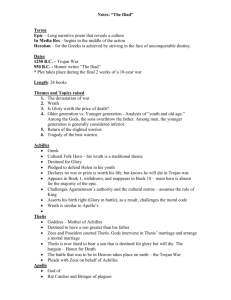The Iliad – Summary Book I (1)
advertisement
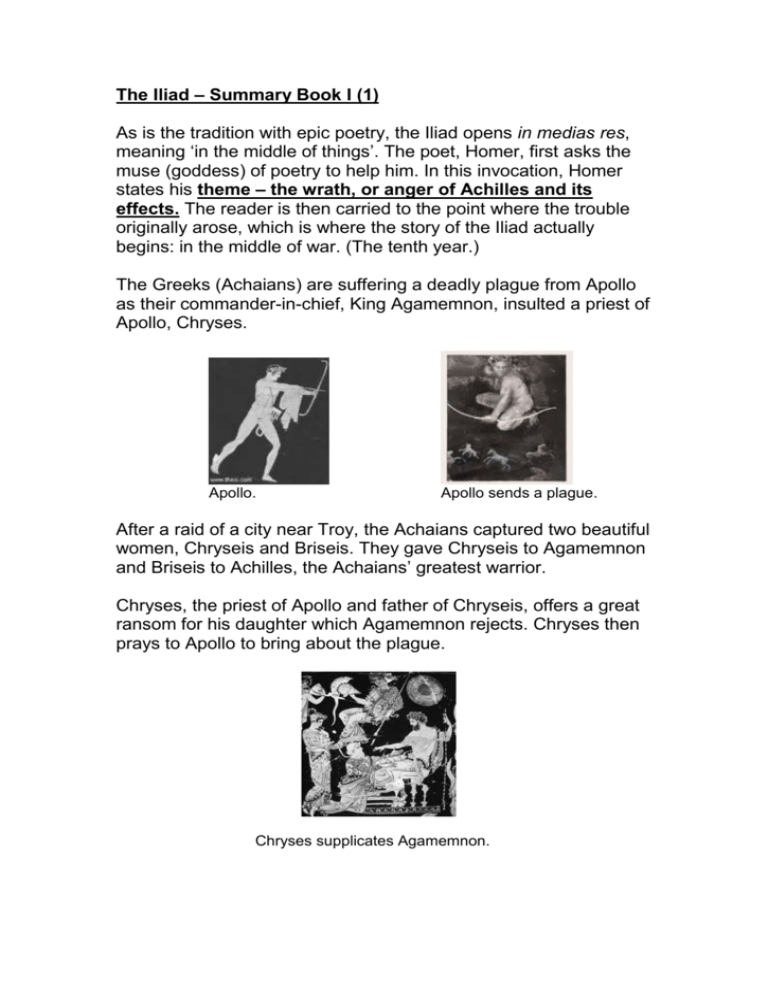
The Iliad – Summary Book I (1) As is the tradition with epic poetry, the Iliad opens in medias res, meaning ‘in the middle of things’. The poet, Homer, first asks the muse (goddess) of poetry to help him. In this invocation, Homer states his theme – the wrath, or anger of Achilles and its effects. The reader is then carried to the point where the trouble originally arose, which is where the story of the Iliad actually begins: in the middle of war. (The tenth year.) The Greeks (Achaians) are suffering a deadly plague from Apollo as their commander-in-chief, King Agamemnon, insulted a priest of Apollo, Chryses. Apollo. Apollo sends a plague. After a raid of a city near Troy, the Achaians captured two beautiful women, Chryseis and Briseis. They gave Chryseis to Agamemnon and Briseis to Achilles, the Achaians’ greatest warrior. Chryses, the priest of Apollo and father of Chryseis, offers a great ransom for his daughter which Agamemnon rejects. Chryses then prays to Apollo to bring about the plague. Chryses supplicates Agamemnon. On the tenth day of the plague, Achilles calls an assembly to find out the cause of Apollo’s anger. The prophet Calchas asks for protection from Achilles first before he explains Apollo’s anger as he will be blaming Agamemnon, who would have the power to hurt him. Achilles agrees. Calchas tells the assembly that by refusing Chryses Agamemnon insulted Apollo. The only solution is to give back the priest’s daughter, Chryseis, along with an offering to the priest’s town. Agamemnon is furious that he must give up his prize while everyone else gets to keep theirs. A quarrel breaks out between Agamemnon and Achilles. Achilles is disgusted that Agamemnon is so unwilling to give up the girl in order to save his army. Achilles says it is not right to take from the soldiers that fight for him, especially when all the prizes have already been handed out. Achilles suggests that Agamemnon gets his first choice of prize from the next town they sack. Agamemnon refuses and wants immediate compensation from one of the other Achaian leaders. Achilles threatens to sail home with his Myrmidons (his troops) and leave the war. Agamemnon provokes Achilles and demands Achilles’ own prize, the girl Briseis. Achilles is stunned by this public disgrace. In Achilles’ eyes Agamemnon abuses his power ad is guilty of ‘hubris’, arrogant behaviour that offends the gods. Achilles is just about to kill Agamemnon with his sword when Athena, sent by Hera, comes to stop him. She grabs him by the hair and tells Achilles to insult Agamemnon with words only and not to harm him. Achilles does as she wishes. Athena stops Achilles from killing Agamemnon. Nestor, a wise old man, tries to persuade both Agamemnon and Achilles to calm down. He does not succeed. Achilles leaves with his friend Patroclus and the Myrmidons. Odysseus returns Chryseis to her father. Agamemnon sends his two heralds, Talthybius and Eurybates, to get Achilles’ girl Briseis. Achilles treats them with respect when they come, as he says his quarrel is not with them. Briseis is taken from Achilles by the two heralds, Talthybius and Eurybates. Achilles asks his mother, the goddess Thetis, for help. He asks her to get Zeus to ensure that the Trojan armies defeat the Achaians until they come begging for his return to battle. Achilles hopes that this result will cause disgrace to Agamemnon and repay the wrong done to Achilles. Thetis agrees. She visits Zeus on Olympus. He reluctantly agrees as he does not want his wife bothering him about helping the Trojans. Hera suspects what is happening and does quarrel with Zeus. Her son, Hephaestus, restores the peace and the gods continue with feasting. Thetis supplicates Zeus. (The scene on Olympus has a strong comic element. Their quarrel does not seem as serious as the quarrel that has just taken place between Achilles and Agamemnon. Zeus and Hera carry on like a domestic couple, picking arguments with each other. However, once Zeus has made his mind up on something the gods fall into place as he is a power to be reckoned with. When dealing with mortals there is no trace of humour, e.g. When Apollo sends the plague to the Greek camp or when Athena has to calm Achilles down.)
